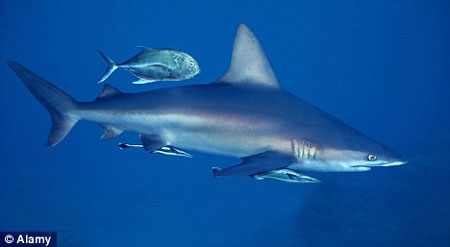Decode the shark's super sense of smell
Sharks can smell the smell of a drop of blood falling into the ocean 500m away or distinguish a drop of blood in a million drops of sea water, this mystery has been answered by scientists.
Researchers from the University of South Florida, USA, found that the shark's nose uses the olfactory receptor to detect prey within half a second, equal to the time when the scent spreads to one side. nostrils and they are comparable to the other nostrils. As soon as the signal is caught, this 'top' predator quickly moves towards the first scent.
The conclusion was published in today's Journal of Biology, helping to decipher one of the long-standing mysteries of sharks. Scientists conduct many experiments on 8 small sharks of the Squalidae family and a gray-brown shark. Dr. Jayne Gardiner, the lead researcher, attached two tubes to the heads of these sharks and released them into a 50-liter seawater tank, then released the bait.

Sharks can smell the smell of a drop of blood 500m away from it.
After observation, Dr. Jayne found that sharks rely on a combination of directional signals, aromas and water flow to determine the direction and find their prey. If the interruption between the scent on one side of the nostril and the other is about 1/10 or 1/2 of a second, the shark will head towards the place where they smell the scent for the first time.
'This is a very interesting idea when animals use concentration to determine the scent. Most creatures have two sensor bodies with scents, be it nostrils or antennae, and they use these two agencies to compare with each other and then to the side with the most powerful signs. However, when odors are dispersed by air or water, the distinction will become quite chaotic , "said Dr Gardiner.
Not only did it shed light on sharks' knowledge, this study also led to the use of better equipped underwater robots to find the source of chemical leaks such as oil spills in the Gulf region. 'This finding can be applied to underwater devices. Robots were previously programmed to follow the scent by comparing their level of concentration, but robots could not function as well as animals and could not be as fast as sharks, " said Dr. Gardiner. determined.
Source: Daily Mail
- People are losing their sense of smell because of pollution
- Which does shark use to locate smell?
- Loss of appetite reduces desire
- Interesting revelations about smell and smell
- People with good spatial memory are good at sense of smell
- Do not smell anything - unexpected signs of dying
- Birds use the sense of smell to detect enemies
- Smell, don't close your eyes
- The mystery of the relationship between poor sense of smell and the risk of death
- Advertising aimed at the sense of smell
- The sense of smell helps birds navigate when flying at sea
- New discovery of the sense of smell of Anopheles mosquitoes
 Surprised: Fish that live in the dark ocean still see colors
Surprised: Fish that live in the dark ocean still see colors Japan suddenly caught the creature that caused the earthquake in the legend
Japan suddenly caught the creature that caused the earthquake in the legend A series of gray whale carcasses washed ashore on California's coast
A series of gray whale carcasses washed ashore on California's coast Compare the size of shark species in the world
Compare the size of shark species in the world